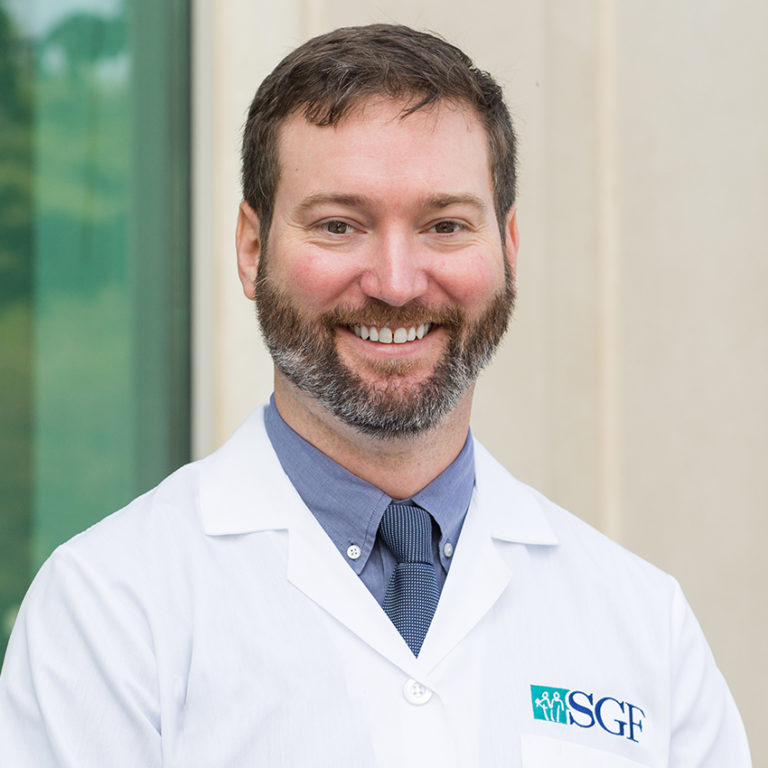Sometimes the road to parenthood can be challenging and pregnancy does not come easy but many people wait to seek the help they need because of preconceived fears about fertility treatment. Sometimes, people are unsure about when it’s time to see a fertility specialist and instead put off this appointment in the hopes pregnancy will happen spontaneously.
Fertility specialist Dr. Steven Gay explains the basics of fertility treatment, why people should seek fertility care sooner than later, and what should be considered when deciding on a fertility center.
1. When is the right time to see a fertility specialist?
SGF follows the recommended guidelines for when to see a fertility specialist. Infertility is present based on the following definition. When a woman is:
- Under 35 with regular menstrual cycles and no pregnancy after 1 year
- 35 to 39 with regular menstrual cycles and no pregnancy after 6 months
- 40 or over with regular menstrual cycles, a more immediate evaluation and treatment is warranted
Other reasons to seek an early evaluation include:
- Irregular menstrual cycle
- History of pelvic surgery (such as the removal of an ovarian cyst, ablation of endometriosis, ectopic pregnancy, tubal surgery, or ruptured appendix)
- Blocked tubes
- Severely painful periods
- Other female fertility diagnosis such as PCOS, endometriosis, or recurrent pregnancy loss
- Single woman pursing motherhood
- LGBTQIA+ family building
2. Are there still options for women to get pregnant after age 40?
A woman’s age is the single most important indicator of fertility potential. As you get older, getting pregnant becomes more difficult. However, if age does become a barrier to seeking treatment, SGF offers donor egg treatment in which a woman uses another woman’s eggs (from an egg donor) rather than her own. SGF is the leading provider of donor egg treatment in the US.
3. What types of fertility treatment are available?
We strive to do what’s in the best interest of our patients to meet their goals. This means using an individualized approach to care, recommending patients begin with the simplest, most effective treatment options first based on their medical history, diagnosis, and personal circumstances.
Many patients start with a more basic treatment, such as ovulation induction (OI) or superovulation, coupled with intrauterine insemination (IUI). For patients needing advanced treatment, in vitro fertilization (IVF) offers the highest treatment success rates and outcomes.
4. How important is the lab at a fertility center?
SGF’s state-of-the-art embryology, andrology, and endocrine laboratories have reached national and international distinction for offering highly sophisticated laboratory procedures.
SGF is home to 12 state-of-the-art IVF labs and procedure centers in the U.S. Our labs are equipped with the very latest technology and are accredited by the Accreditation Association for Ambulatory Health Care and Joint Commission.
Our embryology labs are also accredited by the Society for Assisted Reproductive Technologies (SART), an organization whose mission it is to establish and maintain standards for assisted reproductive technologies (ART) to ensure patients receive the highest possible level of care. SART clinics meet the highest standards for quality, safety, and patient care. Because accurate and reliable lab results can significantly impact patient outcomes, SGF invests tremendous resources to ensure we maintain these accreditations.
5.What should you look at in a practice’s success rates?
For reproductive endocrinologists there are two numbers that represent a successful cycle: “clinical pregnancy rate” and “ongoing/live birth rate.” The difference in the two numbers is due to the number of miscarriages — pregnancies that did not result in a viable birth.
Many patients consider success rates a primary reason for selecting a fertility center — and rightfully so. When reviewing IVF success rates, be educated and learn how to compare apples to apples — are you looking at a clinical pregnancy rate or ongoing/live birth rate? Are you looking at all age groups or a select demographic? At SGF, we pride ourselves on giving patients all statistics available not only in the spirit of transparency, but also so that they can make the most informed decisions. Ultimately, your success rates will depend on many factors including your diagnosis, age, and previous fertility history.
View SGF’s latest IVF success rates, here.
6. Are high-tech treatments the only way patients become pregnant?
When patients meet with their physician, they are often surprised to learn that in vitro fertilization (IVF) may not be their first course of treatment. In reality, most patients start with a more basic treatment option. In fact, about 50 percent of treatment cycles performed at SGF include ovulation induction and IUI — basic treatments requiring less medication and fewer monitoring appointments with a lower cost.
7. What if we don’t have insurance coverage for treatment?
SGF works with over 30 insurance providers and, as a result, 90 percent of patients with insurance have coverage for their initial consultation. Further, 70 percent have at least some, if not full, coverage for diagnostic testing and treatment. For those individuals who do not have insurance coverage for treatment, we offer exclusive financial programs — discount programs and guarantee programs to help make treatment more affordable.
Our top priority at SGF is to clear the obstacles our patients face when trying to start a family. We feel that by reducing or eliminating the financial stress of fertility treatment, our patients have a better overall experience and outcome.
Seeking fertility treatments early offers the best chances of success, so let us help you get started. To schedule an appointment at a convenient location near you, please call our New Patient Center at 1-877-971-7755 or complete this brief form.
Medical contribution by Steven Gay, M.D.
Steven Gay, M.D., is an award-winning physician, board certified in Obstetrics and Gynecology (OB/GYN) and Reproductive Endocrinology and Infertility (REI). Dr. Gay graduated with honors from the University of Georgia with a focus on genetics and cellular biology. He then earned his medical degree and completed his residency training at Emory University School of Medicine in Atlanta, Georgia.







